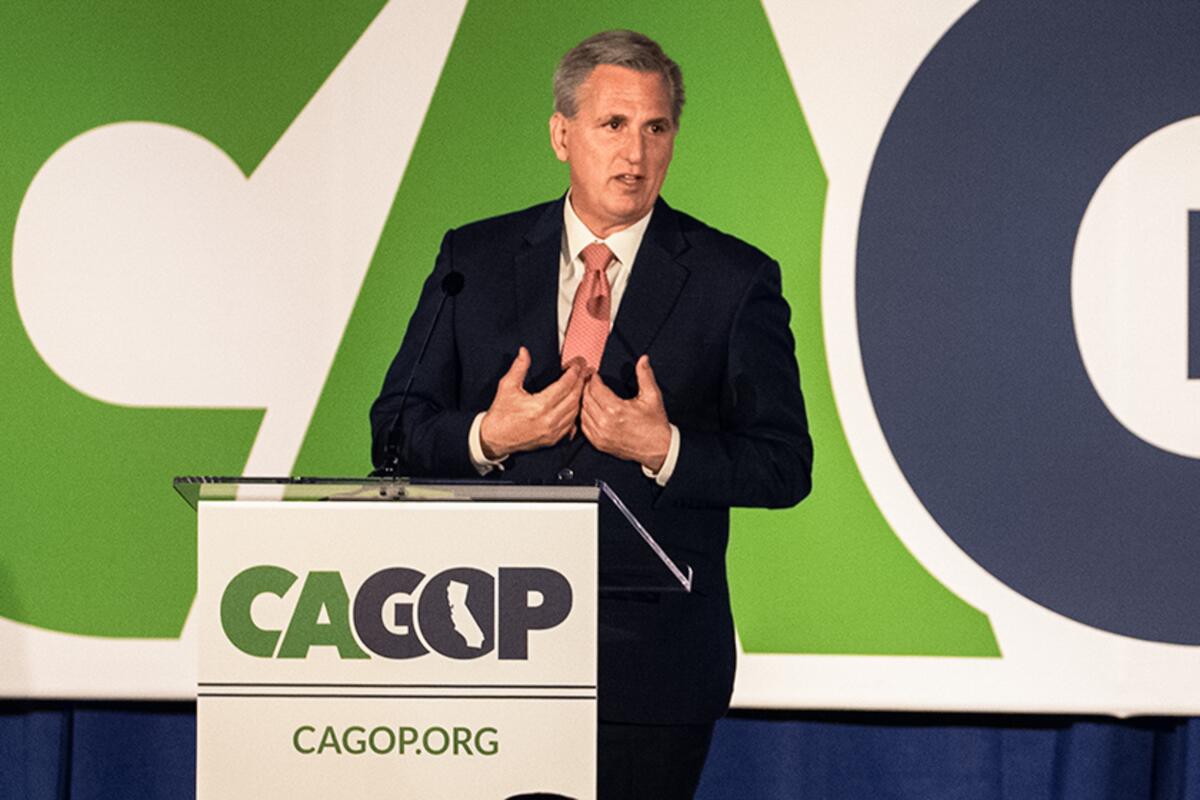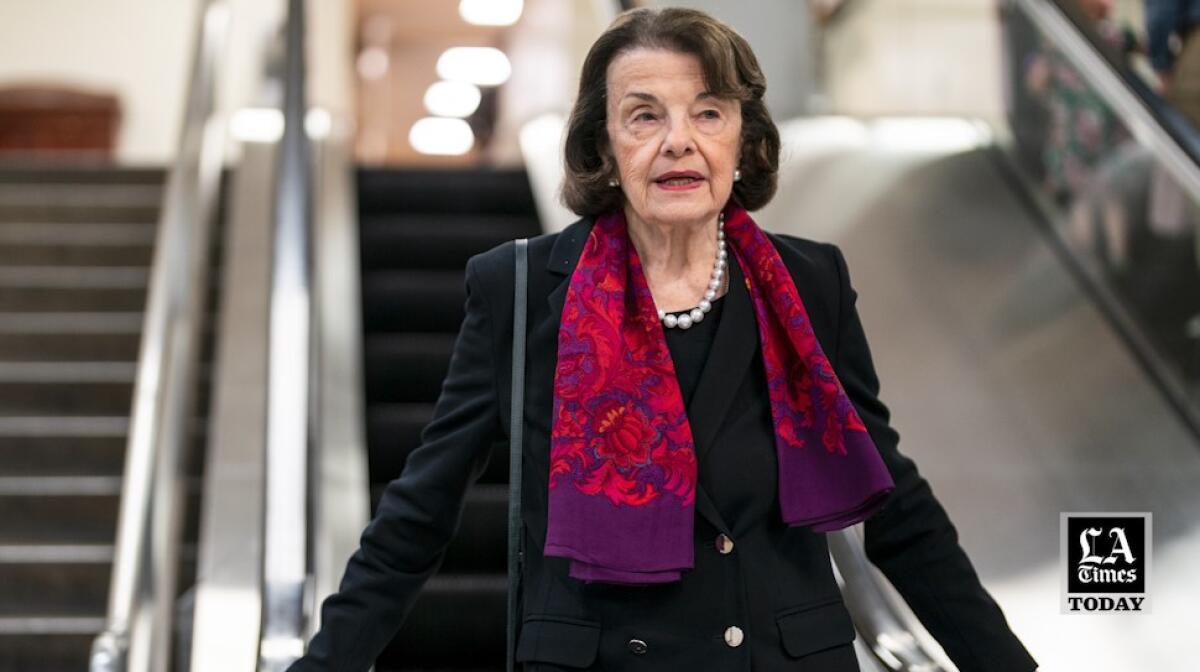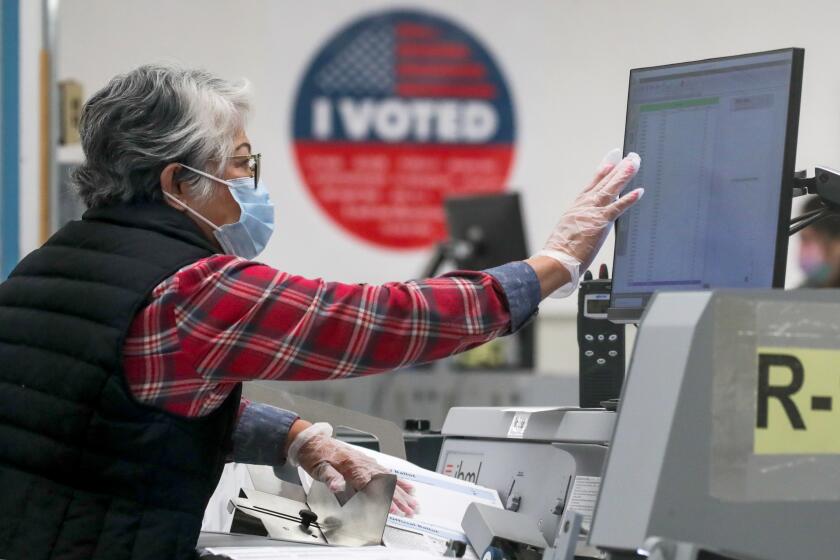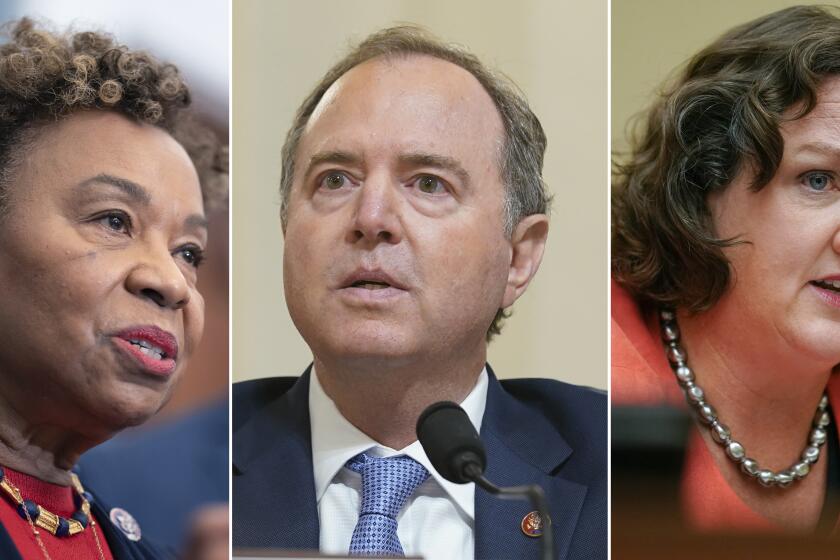California Republicans, buoyed by congressional wins, have no obvious Senate prospects

- Share via
California’s 2024 primary election is less than a year away, yet no prominent Republican has announced plans to seek California’s open U.S. Senate seat — another sign of the decline of a onetime GOP powerhouse that produced two presidents and four governors in the span of just over a half-century.
As one of California’s most highly prized political posts, the Senate seat is being vacated by retiring Sen. Dianne Feinstein, first elected to the office in 1992. Even before Feinstein announced she would not seek another term, some of the state’s most well-known Democrats were lining up to vie for the seat.
The same cannot be said of GOP hopefuls — a sign that “the Republican Party barely exists at the state level,” said Jack Pitney, a political science professor at Claremont McKenna College who was a decades-long Republican until Donald Trump was elected president in 2016.
As more than 1,000 members of the party faithful and their guests prepare to gather in Sacramento this weekend, Pitney noted that a GOP candidate has not won a statewide election since 2006, and California hasn’t elected a Republican to the U.S. Senate since Pete Wilson in 1988.
“So, if you’re a Republican trying to get people to donate to a Senate campaign, you’re asking them to make a bad investment. If you’re a rich person seeking to self-fund a campaign, you’re likely to lose a lot of your own money,” Pitney added. “Obviously, one never says never. It’s possible we could have political and demographic changes in years to come, but at least for the next couple election cycles, it’s very difficult to see how a Republican can win a Senate race in California.”

Still, as the party gathers for a three-day convention starting Friday near the state Capitol in downtown Sacramento, there are bright spots — most notably Bakersfield’s Kevin McCarthy winning the gavel as speaker of the House. He will headline the Saturday convention luncheon.
“To have a Californian — a Republican from California, someone who has been so committed and so dedicated to the California Republican Party — this is a big deal for all of us and we are happy to celebrate,” said state GOP Chair Jessica Millan Patterson.
The party also helped successfully defend GOP Reps. Mike Garcia of Santa Clarita, David Valadao of Hanford and Michelle Steel of Seal Beach in competitive congressional races, aided farmer John Duarte’s win in a new Democratic-tilting district in the Central Valley and nearly ousted Rep. Katie Porter in Orange County, despite the Democrat’s enormous financial edge. Steel and Duarte are scheduled to speak on a dinner panel Saturday evening.
Millan Patterson said the party picking up five California congressional seats since 2020 was instrumental to McCarthy becoming speaker.
“California Republicans are taking a victory lap for sure,” she said.
Holding these seats as well as Rep. Ken Calvert’s Riverside County district next year — during a presidential election, Democratic voters are more likely to turnout — are essential to ensuring the GOP holds the House. The state’s presidential primary, which is scheduled on Super Tuesday in early March next year, also has the potential to be pivotal in the GOP nominating contest because California has the most delegates of any state in the nation.
Democrats saw California as a rare opportunity for offense in the 2022 congressional midterms. Republicans hoped to capture blue territory. Neither parties’ wildest dreams came to pass.
Millan Patterson said that some Republicans were testing the waters for a potential Senate run and could emerge during this weekend’s convention. But she added that she expected the state’s early presidential primary and targeted congressional and legislative races to be the state party’s primary focus of the 2024 election.
California has the most Republican voters in the nation because of its size, but they are vastly outnumbered by Democrats and roughly on par with voters who decline to express a party preference.
This has prompted a strategic shift by the party to use its limited resources to focus on the races where it can be most successful, a strategy first championed by former legislative leader Jim Brulte when he became state party chairman in 2013.
“When you’re the majority party, people suck up. Donors suck up. Volunteers suck up. So you have more money than you could possibly spend efficiently,” Brulte said, pointing at the enormous sums of money Democratic Gov. Gavin Newsom raised for non-competitive races.
The state’s Democrats have a significant financial edge. In 2022, the California Democratic Party reported raising $29.7 million and ending the year with $17.2 million in the bank, according to the secretary of state’s office. The state GOP raised $13.5 million in the same period, with $652,000 remaining in its coffers at the end of 2022.
“When you’re the minority party, not just in California, when you’re the minority party in any state, you have to much more jealously guard your resources because you don’t have that many,” Brulte said. “I think at the end of day, helping maintain the congressional majority is priority No. 1. Picking up a couple legislative seats would be a good thing as well.”
Brulte expects a GOP Senate candidate to emerge but is skeptical that he or she would receive significant national or state party support.
Lanhee Chen, a well-regarded academic and policy advisor to Republican presidential candidates, ran for state controller last year and performed the best of any GOP statewide candidate in recent memory (and won the most votes of any Republican candidate in the country). He lost by 10.6 percentage points.
The Stanford University lecturer said he has been urged to run for the Senate seat but has misgivings for several reasons: Running statewide in California is enormously expensive and GOP donors are tired of investing in statewide races here because of the lack of success in nearly two decades. Making inroads among the heavily Democratic voting blocs in Los Angeles County and the Bay Area is a daunting challenge. There is great uncertainty over who will be the Republican presidential nominee and appear at the top of the ticket. And a federal race places a pointed focus on issues such as abortion, gun control and immigration that are particularly divisive in blue states such as California.
“I just don’t see a pathway to winning there,” Chen said. “It hasn’t stopped people from talking to me about it.”
Other Republicans who have recently run in statewide races — radio host Larry Elder, former San Diego Mayor Kevin Faulconer, state Sen. Brian Dahle of Bieber, attorney Mark Meuser — have not publicly expressed any interest in running for Senate.
So far, 14 people have filed paperwork to run for the seat with the Federal Election Commission — eight Democrats, five Republicans and one candidate affiliated with a minor party. Reps. Porter, Adam B. Schiff and Barbara Lee — all Democrats — are the most visible candidates in the race. The remainder are unknowns.
With Sen. Dianne Feinstein having announced that she won’t seek another term, the race to replace her has heated up. Two Southern California Democrats have taken a strong early position for the state’s top-two primary.
Under California’s jungle-primary system, the two candidates who receive the most votes move on to the general election regardless of party. If the Democratic vote splinters among multiple candidates, a Republican could advance if GOP voters consolidate behind one candidate.
Given the state’s electoral tilt, the chances of a GOP candidate being successful in a statewide contest here appear to be extremely slim, barring an unprecedented shift among the state’s voters or Watergate-like event. But political observers argue that a strong voice raising issues such as taxes, water policy, high-speed rail and other matters important to California voters would elevate political discourse in the state and benefit all voters.
“It’s amazing to me that no one is coming in to say, ‘I want to push candidates to respond to these very real concerns in a basically one-party rule state,’” said Jessica Levinson, an election law professor at Loyola Marymount University. “There’s a bunch of things that aren’t hot-button national topics where you would think we would benefit from a diversity of viewpoints.”
More to Read
Get the L.A. Times Politics newsletter
Deeply reported insights into legislation, politics and policy from Sacramento, Washington and beyond. In your inbox three times per week.
You may occasionally receive promotional content from the Los Angeles Times.













